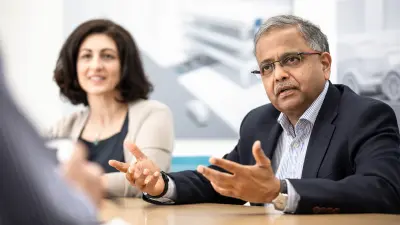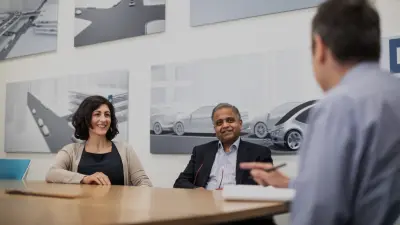Engineering a new perception
In this interview, Arun and Maurizia discuss some of the major topics and trends relating to engineering and technology. Here, the focus is on challenging outdated perceptions of STEM careers – within schools and at home.

Engineering has a diversity problem, with a low percentage of ethnic minorities and women in engineering. Where are we going wrong when it comes to producing the pipeline of people we need within industry?
AS: It starts at school. We have a low level of inspiration for kids when it comes to engineering in this country and we desperately need to address that. I spent 12 years in Germany where engineers are given a higher status. That comes down to culture. In Germany, they believe in creating things, they believe in the growth of industry as a means of strengthening the economy. In the UK, however, engineers are less valued and have an outdated image, while the profession in reality requires a certain set of skills and qualifications often misunderstood by the general public.
Do you recognise this situation in Italy, Maurizia?
MB: Yes, there are similar problems, certainly when it comes to gender within engineering. The bias starts even earlier than schools – it’s embedded in every aspect of our culture. There is a real gap in the understanding of the career possibilities for women within engineering. You see it from toys, from books, from role models – it starts from an early age in both Italy and the UK.
From my own personal experience, when I chose to study mechanical engineering, my family made it clear that they didn’t think that was a good idea. I had to fight to study engineering from the very start.
So, how do we get the message across to parents and teachers that actually engineering is a fantastic profession which offers well-paid jobs and a fulfilling career?
MB: You need to talk about it – and then keep talking. You need to go into the schools, meet the students, show them the fascination of the work we do. As an engineer, you can have a real impact on future generations. That’s the message we have to get across.
AS: I would agree with that. We owe it to the next generation to go into schools and engage with students to let them know what is possible. We need to show them what it’s about and we need to help open doors.
For many years at Bosch, we have gone into universities to try to encourage students into the automotive business. But we need to make greater efforts to go into the schools as well, to get them at a younger age, before they make career choices. Saying that, it is not always that easy. I’ve tried before at my daughter’s school – an all girls’ school - but the headmaster was more into music, and his interests sort of set the tone. That got me wondering whether having segregated boys and girls schools is a contributory factor in the gender divide. Engineering is still typically perceived as a man’s world. I grew up in a co-educated school and engineering was talked about more freely.

MB: I think you are right. It is a contributory factor. My daughter goes to a girls’ school in the UK and some parents have actually moved their children from that to a co-ed school because they wanted a more technical emphasis on what was being learnt. In a girls’ school, there is a strong subconscious bias and that results in doing things that would typically be perceived as having been of interest to girls. So, there is no building Lego, those sorts of activities. That’s a shame. I personally went to a co-educational school in Italy, but my fellow classmates and teachers were all female. Despite that I chose to go on to study engineering. So, it is not impossible.
Why did you choose to go down that route?
MB: There was no-one in my family from an engineering-related background. I went down that route because I was passionate about technology, having the chance to take something from the start, to develop it, to build it, to take it through a process.
Let’s talk about the perception of engineering inside schools. Many teachers have very little idea about the profession. How do we let teachers know academic and vocational routes are a good way in?
AS: There is a role here for the professional engineering institutions and organisations like the Royal Academy of Engineering to continue doing the great work they do and encourage more conversation between academia and industry. Teachers should be supported to get more industry experience. Maths and physics are often seen as tough subjects for kids because they have difficulty understanding the application in the real world. That’s got to change. There must be more cross-fertilisation between industry and academia. Formula Student is a good example of how well it can work. In such places inspiration is born.
But you are busy people. Have you got time to play a role in educational outreach?
MB: It’s something I try to do, to spend time talking to people about engineering, especially young female students.
It’s also important that we continue to talk to women who started out within engineering but have not returned. It’s not just about getting new people, it’s about enabling women who have dropped out of the profession, often for family reasons. That is a waste of talent that must be addressed. I support that.
Final question: would you recommend a career in STEM to your own children? And if so why?
MB: I most certainly would. I don’t know if my daughter wants to follow that path. She might have other plans. However, I would do so because I’m having such a great experience with Bosch. It is a good feeling to be part of such a forward-looking company that is contributing to the wider society. So yes, I hope my daughter feels this passion too.
AS: My son is already an engineer. He was interested in cars as a kid, and then continued to be interested in technology. He’s a mechanical engineer, like me, but he is very computer literate with more developed software skills. He grew up with computers and has always actively engaged with them and that has evolved.
I’ve lost the second battle – my daughter wants to be a doctor. That’s not a bad profession either! She’s also very good with mathematics, though, so I’ve given her the chance to come back to engineering after the medical career!

